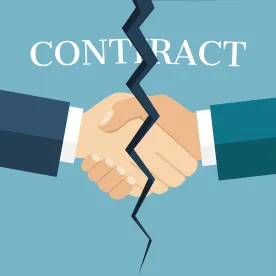Due to the large-scale shutdowns triggered by the Coronavirus pandemic (“COVID-19”), many businesses were unable to operate fully, or not at all. Litigants across the country have sought to be relieved of their obligations under contracts as a result of the pandemic-related disruptions, under legal theories including impossibility, frustration of purpose, and force majeure. As recently decided cases demonstrate, proponents of these theories have faced uphill battles.
Under the doctrine of impossibility, a party may be excused from contractual performance if it “has become literally impossible, or at least inordinately more difficult, because of the occurrence of a supervening event that was not within the original contemplation of the contracting parties.” JB Pool Mgmt., LLC v. Four Seasons at Smithville Homeowners Ass’n, Inc., 431 N.J. Super. 233, 246 (App. Div. 2013). Similarly, “[t]he doctrine of frustration of purpose … excuses a promisor in certain situations where the objectives of the contract have been utterly defeated by circumstances arising after the formation of the agreement.” Howard-Arnold, Inc. v. T.N.T. Realty, Inc., 315 Conn. 596, 605 (2015). Also, a force majeure clause may relieve a party of its obligations under a contract if certain conditions make performance impracticable. Facto v. Pantagis, 390 N.J. Super. 227, 232 (App. Div. 2007)
Recently, New Jersey’s Appellate Division analyzed whether the doctrine of impossibility excused a party’s failure to pay a settlement reached with its insurer. The operative settlement required Arch-Concept to pay $275,000 in installments, and in the event of breach, a lump sum payment of $425,000, less payments already made. Arch-Concept made payments through June 2020, but then requested “forbearances due to circumstances allegedly arising from the COVID-19 pandemic and its impact on defendants’ business.” Hartford Underwriters Ins. Co. v. Arch-Concept Constr., Inc., 2022 WL 2340765, *1 (N.J. Super. Ct. App. Div. June 29, 2022).
Although Arch-Concept claimed that COVID-19 made it impossible to perform its obligations, it failed to “provide any proof to support that [it] was unable to remit installments as promised because of a supervening event that was not within the original contemplation of the contracting parties.” Id. at *3 (citations omitted). Moreover, Arch-Concept’s President, a named individual responsible party under the settlement, failed to certify that he was personally unable to pay. Finding the parties were sophisticated commercial entities represented by counsel, the Court affirmed the lower court’s ruling enforcing the terms of the settlement agreement.
A State Court in Delaware also recently dealt with a matter concerning the impact of the pandemic on contractual obligations. Simon Prop. Grp., L.P. v. Regal Ent. Grp., 2022 WL 2304048 (Del. Super. Ct. June 27, 2022), concerned a multi-lease dispute between a commercial landlord and movie theater company, where each lease at issue contained a force majeure clause obligating Regal to pay rent regardless of the occurrence of certain events. After government mandates responding to COVID-19 compelled the closure of movie theaters, Regal defaulted on its lease obligations.
Looking to the plain language of the contracts, the Court held that “[t]he leases unambiguously and clearly allocate risk of impossibility and impracticability to [Regal].” Id. at *5. Furthermore, the Court held the force majeure “provisions allocate risk for unforeseeable events to [Regal]. Based on the great weight of authority in Delaware and in other jurisdictions, Regal is not excused from its obligations as Guarantor pursuant to the Leases.” Id. at *6.
Connecticut’s Supreme Court also recently resolved a related issue. In AGW Sono Partners, LLC v. Downtown Soho, LLC, 343 Conn. 309 (2022), the Court considered whether a restaurant owner was able to withhold rent due to restrictive executive orders regarding COVID-19. Specifically, Downton Soho claimed that the doctrines of impossibility and frustration of purpose relieved it of its rent obligations due to Governor Lamont’s executive orders that heavily restricted its operations.
After evaluating the executive orders, and the lease at issue, the Court held that the doctrines of impossibility and frustration of purpose did not excuse performance. Regarding impossibility, the Court found that, even under Governor Lamont’s heaviest restrictions, use of the restaurant was not impossible, since takeout service was still permitted. Although Downtown Soho argued that the loss of dining and bar services made operation non-profitable, in the Court’s view, operation was not impossible. In resolving the frustration of purpose arguments, the Court recognized that since the lease did not specify what type of dining had to occur on the property, the implementation of takeout would not frustrate the purpose of the lease. The Court therefore affirmed the findings of the lower court but remanded as to damages.
In the midst of the pandemic, one of the authors wrote an article predicting how the pandemic could affect contractual performance, in the context of force majeure clauses. Undoubtedly, as we continue to emerge from the pandemic, the body of case law around these issues will become even clearer. But the takeaway from the foregoing cases is that while the road seeking relief from contractual performance may be a steep one, cases rise and fall on the wording of the individual contracts at issue, as well as the specific underlying facts. Consequently, litigants should not be deterred from pursuing their rights. Moreover, a pivotal step for businesses is to have counsel re-evaluate contractual language to determine whether performance is ever excused and what events are included in provisions that could excuse performance, how risk is allocated amongst the parties and to which party or parties it is allocated, and whether the contracts have specified purposes that may have been frustrated due to COVID-19 or the resulting government restrictions.





 />i
/>i

